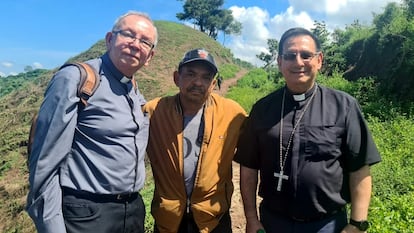Kidnapping in Colombia: The return of the great national trauma
The ELN guerrilla organization refuses to renounce a practice that has affected more than 50,000 victims in recent decades


Luis Eladio Pérez spent almost seven years as a hostage in the jungles of Colombia, held by FARC guerrillas from 2001 to 2008. In Infierno Verde (Green Hell), the book he published after his release, he confesses that he contemplated taking his own life. At various times during his prolonged captivity, he thought he was worth more dead than alive, because the anguish of his family touched the bottom of his soul and he had taken out insurance for enough money to help them overcome such as a situation. He spent long years in chains, suffering leishmaniasis and a heart attack. “The conditions were absolutely inhumane,” and included “indescribable physical and emotional torture,” he said some time later, as a victim, in an appearance before the Special Jurisdiction for Peace (JEP).
Luis Eladio, as everyone calls him, is one of the most notorious cases of a scourge that has become an epidemic in Colombia. Kidnapping — one of the cruelest and societally most-repudiated crimes — is once again stirring up public debate due to the actions of the National Liberation Army (ELN). The last active guerrilla organization in Colombia took 12 days to free the father of soccer player Luis Díaz and currently holds about 30 hostages. It is also reluctant to abandon this practice, despite being seated at a dialogue table with representatives of Colombian President Gustavo Petro.
Government negotiators were forced to note in a communiqué that kidnapping is a crime against human dignity, which causes immense suffering to the families of hostages. Kidnapping “causes serious damage to the confidence of Colombian society in the possibility of achieving peace,” reads the document signed by the delegates, who add that taking hostages “generates hatred against its perpetrators that is difficult to overcome, it is a continuous crime — since it is prolonged beyond the very act of retention — [that] generates permanent anguish for the kidnapped and their loved ones, and a total rejection by the national and international community.”
The chains of kidnapping continue to be carried after freedom is regained, explains the Colombian Truth Commission’s final report. The physical, psychological, and economic impacts are permanent for many of the victims and have changed their way of living, feeling, and even relating to others. Being a hostage becomes an open wound that never heals. The Truth Commission report describes it as “a suspended death.” For Jesuit Father Francisco de Roux, who chaired the commission, it is “the crime that most broke and divided Colombians.”
Calculating the total number of victims has not been an easy task. Several institutions have attempted to provide figures. A few years ago, an investigation by the National Center of Historical Memory documented 39,058 people who had been kidnapped at least once in 40 years. The Truth Commission raised that figure to at least 50,770 in the context of the armed conflict between 1990 and 2018, although it estimates that underreporting may make the real figure closer to as many as 80,000 cases. The main perpetrator was the now-defunct FARC, which accounted for 40% of cases, followed by other paramilitary groups (24%) and the ELN (19%), which carried out 9,538 kidnappings in that period.
From the 1970s on, kidnapping become more widespread throughout Colombia. In the 1980s, the number of cases increased and although there was a temporary drop after the 1991 Constitution was signed, the number of hostage-taking incidents experienced an exponential increase between 1996 and 2002.
For nearly two decades, the dimension of the phenomenon was starkly reflected in Las voces del secuestro (The voices of kidnapping), a radio program to which the families of hostages would turn in the early hours of the morning to send messages of support to their loved ones, many of them held in the depths of the jungle. The program gained notoriety at the turn of the century, when the issue was at the top of the public agenda due to a spate of extortive kidnappings by different groups in addition to the kidnappings of politicians and military personnel by the FARC. The rejection of kidnapping brought millions of people onto the streets in massive marches.
It was precisely the prolonged kidnappings of politicians, with the purpose of forcing an exchange with the government, that was one of the FARC’s cruelest crimes. This strategy intensified in the twilight of the administration of Andrés Pastrana (1998-2002), after the failed El Caguán negotiations with the FARC. The families of victims tirelessly pressured the government of Álvaro Uribe (2002-2010) to obtain a humanitarian agreement that never materialized. The painful chapter of political kidnappings, which shocked a society ravaged by all manner of violence, resulted in 13 deaths, eight unilateral kidnappings — among them that of Luis Eladio Pérez — 15 rescues carried out by the army — including Ingrid Betancourt — and two fugitives. Many of the survivors wrote books recounting the details of their captivity.
After signing the peace agreement, the FARC acknowledged that they used kidnapping as a tactic of war and have asked for forgiveness. It was a “systematic and massive” practice for at least 30 years, between 1982 and 2012, the JEP said in charging the former leadership of the guerrilla organization in 2021 for a series of war crimes and crimes against humanity related to the deprivation of liberty of civilians and military personnel. It is now one of the most advanced macro-cases in the transitional justice system.
When they sat down to negotiate in Havana, the FARC had already renounced the practice. “To the ELN I share a self-criticism that [former FARC leaders] Jacobo Arenas and Alfonso Cano instilled in us and we belatedly heeded: kidnapping is inhumane, anti-political and unnecessary,” Rodrigo Londoño, the FARC commander who signed the peace agreement, wrote on social media last week after the release of Luis Manuel Díaz.
The last guerrillas under arms insist that these so-called “retentions” are part of their “financial operations,” despite the fact that it is a violation of the already agreed ceasefire and prohibited by international humanitarian law. This has been a recurring obstacle in attempts to negotiate a peace agreement with the ELN. “It is untenable to argue, from an ethical point of view, that trading in human beings is licit, even under the conditions of an armed conflict,” government negotiators have pointed out. The cry against kidnapping has resurfaced in Colombian society, a loud and clear protest. But the ELN remains reluctant to hear it.
Sign up for our weekly newsletter to get more English-language news coverage from EL PAÍS USA Edition
Tu suscripción se está usando en otro dispositivo
¿Quieres añadir otro usuario a tu suscripción?
Si continúas leyendo en este dispositivo, no se podrá leer en el otro.
FlechaTu suscripción se está usando en otro dispositivo y solo puedes acceder a EL PAÍS desde un dispositivo a la vez.
Si quieres compartir tu cuenta, cambia tu suscripción a la modalidad Premium, así podrás añadir otro usuario. Cada uno accederá con su propia cuenta de email, lo que os permitirá personalizar vuestra experiencia en EL PAÍS.
¿Tienes una suscripción de empresa? Accede aquí para contratar más cuentas.
En el caso de no saber quién está usando tu cuenta, te recomendamos cambiar tu contraseña aquí.
Si decides continuar compartiendo tu cuenta, este mensaje se mostrará en tu dispositivo y en el de la otra persona que está usando tu cuenta de forma indefinida, afectando a tu experiencia de lectura. Puedes consultar aquí los términos y condiciones de la suscripción digital.








































